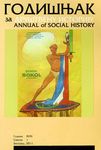Grand Prix Београда 1939 - спољнополитички контекст великих аутомобилских трка
Belgrade Grand Prix 1939 - Foreign Policy Context of Great Car Races
Author(s): Marko MiljkovićSubject(s): History
Published by: Udruženje za društvenu istoriju
Keywords: Grand Prix; car racing; World War II; Mercedes; Auto Union
Summary/Abstract: Grand Prix championship in the inter-war era was the most important car competition in which factory teams and drivers competed for the title of European Champion. At the same time, Grand Prix races were the ground on which various states and nations conducted political or ideological propaganda, aimed at modelling public opinion both in the country and abroad. In the inter-war period, the greatest success in both directions was achieved by the Nazi Germany, whose teams and drivers of Mercedes and Auto Union dominated Euro-pean races since 1935, spreading the message of superiority of German technology, but also Nazi ideology. Holding Grand Prix in Belgrade on September 3rd, 1939, at the time when Great Britain and France had already declared war to Germany, marked simbolicaly a degree of political closeness between Kingdom of Yugoslavia and Nazi Germany, and comitment of Yugoslav political elite in the forthcoming world war.
Journal: Godišnjak za društvenu istoriju
- Issue Year: XVIII/2011
- Issue No: 1
- Page Range: 7-29
- Page Count: 23
- Language: Serbian

